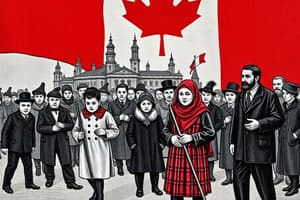Podcast
Questions and Answers
What was one of the key effects of the exclusionary period on the Chinese-Canadian population?
What was one of the key effects of the exclusionary period on the Chinese-Canadian population?
- An increase in immigration from other Asian countries
- No significant change in population
- An increase in population by 25%
- A decrease in population by 25% (correct)
The Canadian government actively encouraged Asian immigration during the early 1900s.
The Canadian government actively encouraged Asian immigration during the early 1900s.
False (B)
What was the primary reason for immigration authorities rating newcomers during Clifford Sifton's term?
What was the primary reason for immigration authorities rating newcomers during Clifford Sifton's term?
To assess their race, perceived hardiness, and farming ability.
The last legal signs of racial discrimination in immigration were removed from Canadian legislation by the late __________.
The last legal signs of racial discrimination in immigration were removed from Canadian legislation by the late __________.
Match the time period with its corresponding immigration policy:
Match the time period with its corresponding immigration policy:
What was the purpose of the 'climate clause' in Canada's immigration act?
What was the purpose of the 'climate clause' in Canada's immigration act?
The Chinese Immigration Act of 1885 placed a head tax on Chinese immigrants to deter them from entering Canada.
The Chinese Immigration Act of 1885 placed a head tax on Chinese immigrants to deter them from entering Canada.
When was the climate clause dropped from the immigration act?
When was the climate clause dropped from the immigration act?
Canada's immigration officials often contacted local American postmasters to check the race of potential immigrants because they were ___ on identifying race.
Canada's immigration officials often contacted local American postmasters to check the race of potential immigrants because they were ___ on identifying race.
Match the following acts with their descriptions:
Match the following acts with their descriptions:
What was the amount of the head tax imposed on Chinese immigrants in 1885?
What was the amount of the head tax imposed on Chinese immigrants in 1885?
Robert Borden was pleased with the arrival of Black settlers in Canada.
Robert Borden was pleased with the arrival of Black settlers in Canada.
What was one result of the head tax on Chinese immigrants?
What was one result of the head tax on Chinese immigrants?
The ___ stated that moving to Canada would be unhealthy for individuals from tropical areas.
The ___ stated that moving to Canada would be unhealthy for individuals from tropical areas.
In what year was the Chinese Exclusion Act enacted?
In what year was the Chinese Exclusion Act enacted?
Which immigrant group faced exclusion in Canada in 1847?
Which immigrant group faced exclusion in Canada in 1847?
A majority of Canadians have negative views toward immigrants who arrived more than 50 years ago.
A majority of Canadians have negative views toward immigrants who arrived more than 50 years ago.
By what percentage did hate crimes against Muslims grow from 2015 to 2019?
By what percentage did hate crimes against Muslims grow from 2015 to 2019?
Close to the bottom of the list of desired immigrants were groups like Italians, Slavs, Greeks, and _______.
Close to the bottom of the list of desired immigrants were groups like Italians, Slavs, Greeks, and _______.
Match the following immigrant groups with their respective years of exclusion in Canada:
Match the following immigrant groups with their respective years of exclusion in Canada:
Which statement is true regarding Canadians' views on immigrants who arrived in the last 15 years?
Which statement is true regarding Canadians' views on immigrants who arrived in the last 15 years?
What was Canada’s immigration policy like in the late 19th to early 20th century?
What was Canada’s immigration policy like in the late 19th to early 20th century?
Flashcards
Xenophobia
Xenophobia
A type of discrimination that targets people based on their nationality or place of origin.
Excluding Immigrants
Excluding Immigrants
The practice of excluding immigrants, especially those perceived as undesirable.
Canadian Multiculturalism
Canadian Multiculturalism
The idea that Canada has a strong cultural identity based on welcoming people from all backgrounds.
Historical Immigration Policies
Historical Immigration Policies
Signup and view all the flashcards
Growing Xenophobia in Canada
Growing Xenophobia in Canada
Signup and view all the flashcards
Hate Crimes
Hate Crimes
Signup and view all the flashcards
Preferred Immigrants
Preferred Immigrants
Signup and view all the flashcards
Chinese Exclusion Act (1923-1947)
Chinese Exclusion Act (1923-1947)
Signup and view all the flashcards
Clifford Sifton's Western Settlement Policy
Clifford Sifton's Western Settlement Policy
Signup and view all the flashcards
Immigration Hysteria during World Wars
Immigration Hysteria during World Wars
Signup and view all the flashcards
Shifting Immigration Policies in the 1960s
Shifting Immigration Policies in the 1960s
Signup and view all the flashcards
Multiculturalism in Canada
Multiculturalism in Canada
Signup and view all the flashcards
Unofficial Barriers
Unofficial Barriers
Signup and view all the flashcards
The 'Climate Clause'
The 'Climate Clause'
Signup and view all the flashcards
Chinese Head Tax (1885)
Chinese Head Tax (1885)
Signup and view all the flashcards
Chinese Exclusion Act (1923)
Chinese Exclusion Act (1923)
Signup and view all the flashcards
Avoiding Direct Confrontation
Avoiding Direct Confrontation
Signup and view all the flashcards
Discriminatory Practices
Discriminatory Practices
Signup and view all the flashcards
Functionally Anti-Black?
Functionally Anti-Black?
Signup and view all the flashcards
Using Postmasters
Using Postmasters
Signup and view all the flashcards
Study Notes
Canadian Immigration History
- Canada's identity is intertwined with xenophobia; exclusion of immigrants is fundamental to its culture, despite multicultural claims.
- Xenophobia has been codified in law against various groups, including the Irish, Chinese, Sikhs, Jews, Japanese, and Haitians.
- Negative views toward immigrants are prevalent, particularly those arriving in the past 15 years (10% hold negative views).
- Hate crimes against Muslims have significantly increased.
- Hate crimes reported to police reached a record high of 2669 in 2020, growing 253% from 2015 to 2019.
- Includes murder of six Muslim men in a Quebec City mosque in 2017.
- Following Confederation, Canada developed its own immigration policies different from Britain.
- Between 1869 and the early 1930s, over 100,000 immigrants annually arrived, starting with British, American, Belgians, Dutch, and Scandinavians.
- Less desirable groups (Italians, Slavs, Greeks, Middle Easterners, Asians, Jews, Roma/Gypsies) were prioritized toward the bottom of the list.
- Black immigrants were specifically excluded based on skin color, not nationality.
"Unofficial" Barriers for Blacks
- Early immigration policies had "unofficial" barriers for Black immigrants, despite no explicitly anti-Black policies.
- Racial discernment of immigrants was challenging due to mail-based application processes, immigration officials used proxy means (e.g., checking with local American postmasters).
- The "climate clause" (1912) was a thinly veiled attempt to exclude immigrants from the African continent.
Chinese Exclusion (1885-1947)
- Head taxes (500 USD) were imposed on Chinese immigrants to discourage immigration.
- The 1923 Chinese Exclusion Act completely banned Chinese immigration.
- These policies severely impacted Chinese communities, decreased the population by 25%, and disrupted family relations.
White & English-biased Immigration (1905-1947)
- The (1896-1905) Minister of the Interior, Clifford Sifton, aimed to populate western Canada by offering free homesteads.
- Immigration selection was biased, prioritizing English-speaking European immigrants.
- Other white immigrant groups were also preferred if English-speaking ones were not available.
Multiculturalism (1960s-Present)
- The 1960s saw an end to racial discrimination in Canadian immigration.
- By 1971, a majority of immigrants were from non-European backgrounds.
- Canada is now a multiracial and multicultural society.
Studying That Suits You
Use AI to generate personalized quizzes and flashcards to suit your learning preferences.




